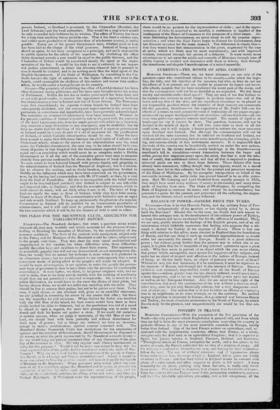THE PLEAS FOR THE BRUNSWICK CLUBS. ARGUMENTS FOR PARLIAMENTARY REFORM.
EXAMINER—The Standard, declares, that when a question arises which interests all, they may worthily and wisely associate for the purpose of con- trolling or directing the measures of Ministers, by the manifestation of the common sentiment. The Gods of the ancients were omnipotent, subject only to the Fates; and the Ministers of the Standard would be rulers, subject only to the people over them. They may steer the state vessel undisturbed and unquestioned in fair weather, but when difficulties arise, those difficulties qualify the cabin boys and swabbers to direct their course. This argument is so essentially popular (we will not say democratical, as our contemporary dis- likes the word) that we cannot but welcome it, even when it is preferred in an obnoxious cause ; but we would suegest to our contemporary that a more convenient mode of giving effect to the people's will might he adopted. It would be more advantageous, in our opinion, to make the people the perma- nent basis of government, than to leave them only the province of occasionally over-ruling it. It were better, we think, to let power originate with, and re- vert to them, than to let them merely meddle with the working of machinery which they are not permitted to remodel or supersede. Or, to resort to a fa- miliar illustration, we would leave to the crew the choice of their pilots, but having chosen them, we would not suffer any meddling with the helm. They should be free to remove their guides, but not to be guides over them. To be sure, if right divine, or any absolute will, gives us an unskilful steersman, we are justified in correcting his errors by any means that offer ; but these ale the remedies for evil occasions. When Sinbad the Sailor was troubled with the Old Man of the Island, the best course would have been to have civilly invited his rider to dismount, but as the gentleman was not of a mood to attend to such a request, the next best proceeding was to make him drunk and dash his brains out against a stone. If we could rid ourselves at certain seasons, when we judge it necessary, of the Old Men of our Is- land, we should bear With them patiently and without disturbance for their term of power ; but as things are ordered, we have no resource, except in restive. recalcitrations against courses esteemed evil. The Standard thinks Brunswick Clubs fine institutions for the expression of opinion and the restraint of Government, should Government be disposed to do wrong, or what the party represented by the Standard accounts wrong— for we would keep our present argument clear of any discussion of the qua- lity of the measure in view. But why require such clumsy instruments as clubs for this purpose ? Would it not be more convenient. to have this de- sired representation of the piddle feeling condensed within the walls of Par- ',Lament 1 Why are we tc look for the representation of the peciple at Penen- len Math, or in a George and Dragon assembly-room ? Surely it would he neil-e con; enient to have the good in essence, and to cork it up for the bern.mfit .4-Ministers in St. Stephen's. When questions arise which affect the inte- rests of all, it is em,:cellent, argues the Standard and its party, to procure the cf -.)pr..icn by clulm: such questions occur every day, and for clubs, let them substitute members for shires, cities and towus, and they are 'Radical Reformers,. If Pediment were the represent:slim; of the people,
there would be no -pretext for the representation of clubs ; and if the repre- sentation of clubs be asserted to be needful, a confession is implied of the inadequacy.of the House of Commons to the purposes,of a third estate. Al- ways distrusting the Government, we never cease to call fur popular repre- sentation ; and when the High Tories begin to distrust the Government, they too discover occasion for the same demand. The difference is simply this— that they would have that demonstration .in the gross, expressed by the roar of mobs, which we think may be more conveniently, and with improved wisdom, conveyed through the person of a delegate. It were surely more advantageous to act upon the minds and councils of Ministers through men of ability coming in contact and discussion with them in debate, than through the tumultuous amid dispute{ manifestations of a mixed assembly.


















 Previous page
Previous page